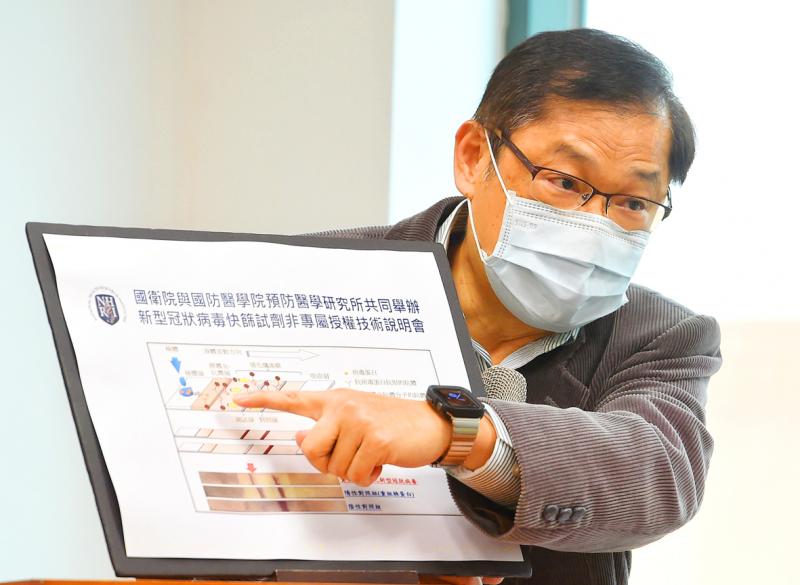The National Health Research Institute (NHRI) and the National Defense Medical Center yesterday announced a prototype COVID-19 rapid diagnostic kit that can provide results in about 15 minutes.
The NHRI and the center’s Institute of Preventive Medicine used SARS-CoV antibodies produced during the SARS outbreak in 2003 and picked out one that can identify SARS-CoV-2, which causes COVID-19, to develop the rapid test kit.
After spending a month developing the test kit, the institutes yesterday in Taipei presented the prototype to pharmaceutical companies in the hope of achieving technology transfers and starting mass production.

Photo: Liu Hsin-de, Taipei Times
The test works by placing a specimen taken from the mouth or nose onto a test strip, which siphons the specimen toward the antibodies on the strip, NHRI National Institute of Infectious Disease and Vaccinology Director Liao Ching-len (廖經綸) said.
As researchers have identified the coronavirus’ spike protein, if the specimen contains SARS-CoV-2, the spike protein would be caught by the antibody and two lines would appear on the test strip, indicating a positive result, he said.
The results are shown in a similar fashion to a pregnancy test — one line means negative and two lines means positive — Liao said.
The prototype has been proven to avoid cross-reaction with other viruses, including human coronaviruses OC43, 229E and NL63; adenoviruses; respiratory syncytial virus; type A influenza viruses H1N1, H5N1 and H7N9; and enterovirus 71, he said.
The prototype is not meant to replace the real-time reverse transcription polymerase chain reaction test, which is currently being used for diagnosis, he said, adding that they hope the rapid test will be used as a complementary measure to allow hospitals to screen patients rapidly and sort them, Liao said.
They also hope experienced pharmaceutical companies can join them in refining the prototype, and manufacture and release the final product for front line disease prevention, he added.
NHRI President Liang Kung-yee (梁賡義) said that the Food and Drug Administration has also launched a scheme, which grants permission for clinical trials and mass production at the same time, to shorten the duration required for a product to hit the market.
If the procedures go smoothly, the test kit could be out in three months, Liang said.
Other countries have also expressed an interest in technology transfers, but the NHRI wants to give priority to Taiwanese companies, he added.

ENDEAVOR MANTA: The ship is programmed to automatically return to its designated home port and would self-destruct if seized by another party The Endeavor Manta, Taiwan’s first military-specification uncrewed surface vehicle (USV) tailor-made to operate in the Taiwan Strait in a bid to bolster the nation’s asymmetric combat capabilities made its first appearance at Kaohsiung’s Singda Harbor yesterday. Taking inspiration from Ukraine’s navy, which is using USVs to force Russia’s Black Sea fleet to take shelter within its own ports, CSBC Taiwan (台灣國際造船) established a research and development unit on USVs last year, CSBC chairman Huang Cheng-hung (黃正弘) said. With the exception of the satellite guidance system and the outboard motors — which were purchased from foreign companies that were not affiliated with Chinese-funded

PERMIT REVOKED: The influencer at a news conference said the National Immigration Agency was infringing on human rights and persecuting Chinese spouses Chinese influencer “Yaya in Taiwan” (亞亞在台灣) yesterday evening voluntarily left Taiwan, despite saying yesterday morning that she had “no intention” of leaving after her residence permit was revoked over her comments on Taiwan being “unified” with China by military force. The Ministry of the Interior yesterday had said that it could forcibly deport the influencer at midnight, but was considering taking a more flexible approach and beginning procedures this morning. The influencer, whose given name is Liu Zhenya (劉振亞), departed on a 8:45pm flight from Taipei International Airport (Songshan airport) to Fuzhou, China. Liu held a news conference at the airport at 7pm,

Authorities yesterday elaborated on the rules governing Employment Gold Cards after a US cardholder was barred from entering Taiwan for six years after working without a permit during a 2023 visit. American YouTuber LeLe Farley was barred after already being approved for an Employment Gold Card, he said in a video published on his channel on Saturday. Farley, who has more than 420,000 subscribers on his YouTube channel, was approved for his Gold Card last month, but was told at a check-in counter at the Los Angeles International Airport that he could not enter Taiwan. That was because he previously participated in two

SECURITY RISK: If there is a conflict between China and Taiwan, ‘there would likely be significant consequences to global economic and security interests,’ it said China remains the top military and cyber threat to the US and continues to make progress on capabilities to seize Taiwan, a report by US intelligence agencies said on Tuesday. The report provides an overview of the “collective insights” of top US intelligence agencies about the security threats to the US posed by foreign nations and criminal organizations. In its Annual Threat Assessment, the agencies divided threats facing the US into two broad categories, “nonstate transnational criminals and terrorists” and “major state actors,” with China, Russia, Iran and North Korea named. Of those countries, “China presents the most comprehensive and robust military threat